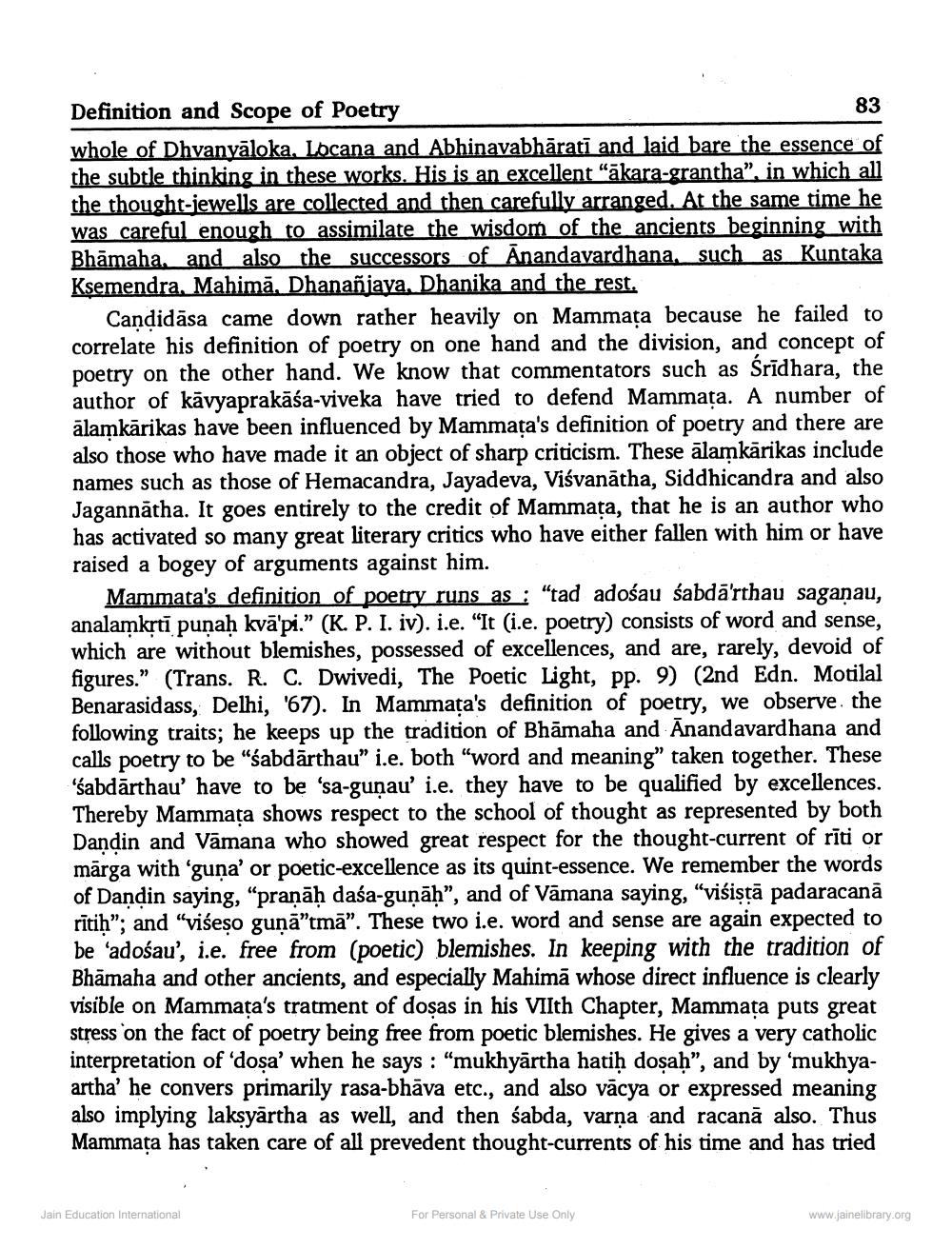________________
Definition and Scope of Poetry
83 whole of Dhvanyaloka, Locana and Abhinavabhārati and laid bare the essence of the subtle thinking in these works. His is an excellent "ākara-grantha”, in which all the thought-jewells are collected and then carefully arranged. At the same time he was careful enough to assimilate the wisdom of the ancients beginning with Bhāmaha, and also the successors of Anandavardhana, such as Kuntaka Ksemendra, Mahimă, Dhananjaya, Dhanika and the rest.
Candidāsa came down rather heavily on Mammata because he failed to correlate his definition of poetry on one hand and the division, and concept of poetry on the other hand. We know that commentators such as Sridhara, the author of kävyaprakāśa-viveka have tried to defend Mammata. A number of alamkarikas have been influenced by Mammata's definition of poetry and there are also those who have made it an object of sharp criticism. These ālamkārikas include names such as those of Hemacandra, Jayadeva, Viśvanātha, Siddhicandra and also Jagannatha. It goes entirely to the credit of Mammata, that he is an author who has activated so many great literary critics who have either fallen with him or have raised a bogey of arguments against him.
Mammata's definition of poetry runs as ; "tad adośau sabdā'rthau saganau, analamkrti punah kvā'pi." (K. P. I. iv). i.e. "It i.e. poetry) consists of word and sense, which are without blemishes, possessed of excellences, and are, rarely, devoid of figures." (Trans. R. C. Dwivedi, The Poetic Light, pp. 9) (2nd Edn. Motilal Benarasidass, Delhi, '67). In Mammata's definition of poetry, we observe the following traits; he keeps up the tradition of Bhāmaha and Anandavardhana and calls poetry to be "sabdārthau" i.e. both "word and meaning" taken together. These 'sabdārthau' have to be 'sa-guņau' i.e. they have to be qualified by excellences. Thereby Mammata shows respect to the school of thought as represented by both Dandin and Vamana who showed great respect for the thought-current of rīti or mārga with 'guna' or poetic-excellence as its quint-essence. We remember the words of Dandin saying, “pranāḥ daśa-guņāḥ”, and of Vāmana saying, “viśistā padaracanã rītih"; and “višeso guna"tma". These two i.e. word and sense are again expected to be 'adośau', i.e. free from (poetic) blemishes. In keeping with the tradition of Bhämaha and other ancients, and especially Mahimā whose direct influence is clearly visible on Mammata's tratment of dosas in his VIIth Chapter, Mammaţa puts great stress on the fact of poetry being free from poetic blemishes. He gives a very catholic interpretation of 'dosa' when he says : “mukhyārtha hatiḥ dosaḥ”, and by ‘mukhyaartha' he convers primarily rasa-bhāva etc., and also vācya or expressed meaning also implying laksyārtha as well, and then sabda, varna and racanā also. Thus Mammata has taken care of all prevedent thought-currents of his time and has tried
Jain Education International
For Personal & Private Use Only
www.jainelibrary.org




